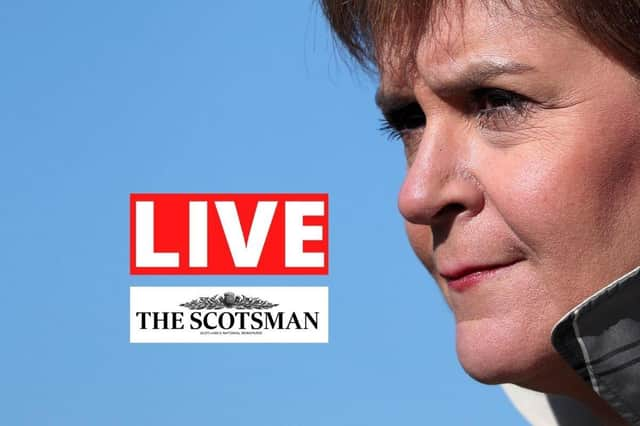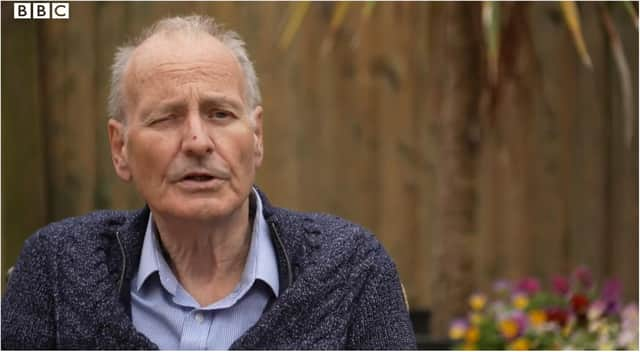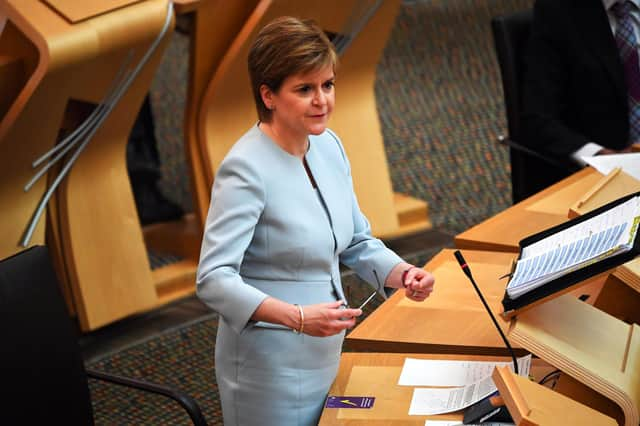Covid Scotand RECAP: Daily coronavirus cases hit new high with almost 3,000 recorded | First Minister pressed for answers on future of school exams | Nicola Sturgeon vows to ‘do everything we possibly can’ to save McVitie’s factory


Scroll down to see the latest news on the pandemic on Thursday, June 24.
Covid Scotland: The latest updates on Thursday, June 24
Key Events
- Daily cases hit new high with almost 3,000 recorded
- Sturgeon vows to save McVitie’s factory
- First Minister pressed for answers on future of school exams
Nicola Sturgeon says Scottish Government has not yet decided if there will be school exams next year.
The First Minister said a decision will be made over the summer, and schools will bee informed before the new term.
Scottish Conservative leader Douglas Ross has accused the Scottish Government of having "lost its way" on education
Nicola Sturgeon: “Can I say a big thank-you to teachers, to all support staff in our schools.
“This has been the most difficult year any of them will ever remember, both professionally, for those working in our education, and for those learning in our education sector.”
“I can never find the words to thank them enough, but I hope everyone knows how deeply appreciative everyone in the Scottish Government and, I’m sure, everyone across Scotland is for everything they have done.”
Nicola Sturgeon is on her feet right now, facing questions about covid and the SQA from opposition leaders.
Andrew Lloyd Webber launches legal action over Government test events programme
Andrew Lloyd Webber has joined others in the entertainment industry in launching legal action to force the Government to hand over the results from its coronavirus pilot events scheme.
The Events Research Programme ran test events at sporting, music and arts venues to assess the safety of large gatherings during the pandemic.
In a statement the group, which also includes musician Peter Gabriel, theatre producer Sir Cameron Mackintosh and music industry trade body Live, accused the Government of “making it impossible to plan for any live entertainment business” by not sharing their findings.
Live shows as part of the scheme have included the Brit Awards, music event Download Festival and a snooker tournament at Sheffield’s Crucible Theatre.
“These events have been a huge success, according to the Government itself in various press reports, showing that with proper precautions in place, live events at full capacity can go ahead safely,” the statement said.
“But the Government chose to keep the live entertainment industry under severe restrictions from June 21, while allowing parts of the economy that have not been subject to similar scientific studies, including hospitality, public transport and retail, to operate.
“The Government has also refused to publish the results from the first phase of the Events Research Programme, despite saying that it would do so on numerous occasions.”
Last week composer Lord Lloyd-Webber rejected an offer from Prime Minister Boris Johnson for one of his West End shows to be included in the pilot scheme for live events.
Road casualties fell 35% last year as traffic levels dropped during pandemic
Casualties on Scotland’s roads fell by more than a third in 2020, as the drop in traffic due to the pandemic led to a large reduction in people being injured and killed.
Statistics for 2020 show casualties fell by 35% from the previous year, reaching the lowest level since records began in 1950.
Total casualties fell by 7,718 to 4,992 while 142 people were killed in 2020, a decrease of 24 from 2019.
Analysis from Transport Scotland says the trend is linked to lower levels of traffic on the roads during the pandemic, with estimates of motor traffic volume falling by 23% from 2019.
Total casualties for all modes of transport decreased with the exception of cyclists, which were up by 2%.
Previous studies have suggested cycling increased by 46% across Britain during 2020.
The reductions in casualties mean Scotland has met its road safety targets, which aim to eliminate road deaths and serious injuries by 2050.
Transport minister Graeme Dey said: “Whilst it is no surprise that with fewer car trips over the lockdown period we’re seeing fewer road casualties, prior to the pandemic road casualties in Scotland had been showing a clear, ongoing reduction.
“Improving road safety further remains a priority for the Scottish Government.
“Our road safety partners and I know that one death on Scotland’s roads is one too many.
“The fact we’ve met all our casualty reductions targets, putting us among the best performing European countries, means very little to those who have sadly lost friends and love ones in tragic circumstances.
“Road deaths are not an inevitability and they should not be expected to happen.
“We are committed to working with our partners to secure the ultimate vision established in Scotland’s Road Safety Framework to 2030 – Vision Zero – where no-one is killed on our roads.”


Man infected with Covid for 10 months says he was' ready to give up on life'
A 72-year-old man thought to be the world’s longest ever Covid-19 patient after testing positive for the virus for 305 days has spoken about the experience.
New system to detect airborne Covid piloted at airport
A new system to detect coronavirus in the air is being trialled at an airport.
Manufacturers Kromek have developed the technology to trace levels of Covid-19 within 30 minutes, which could be used in shops, lobbies and other busy public places.
The firm, based in Sedgefield, County Durham, produces radiation detection technology for the medical, nuclear and security sectors, and has now developed a biological threat detection system.
It works by drawing large volumes of air – 400 litres per minute – and analyses the biological content, which it then tests to detect the presence of coronavirus.
The developers said that by sensing the virus particles before individuals show symptoms, it can reduce exposure to the disease and limit the spread of localised outbreaks.
Kromek chief executive Dr Arnab Basu was “proud” the technology was being tested at Teesside International Airport.
He said: “The device we are trialling is the only technology of its kind which can autonomously detect the presence of Covid-19 from huge areas.
“The technology has the capacity to deliver near-real time monitoring of the presence and prevalence of the virus, enabling a return to normal life.”
Tees Valley mayor Ben Houchen said: “Kromek is a ground-breaking company that has adapted what it does best to develop this system in the face of the coronavirus pandemic.
“We’re delighted Teesside is not just one of the first airports, but one of the first buildings, to be trialling this new detector, which could be a real game-changer.”


How to watch Nicola Sturgeon at FMQs, when is the First Minister speaking at Holyrood
Nicola Sturgeon will face questions from MSPs in the Scottish Parliament today for the final time before the summer recess.
Comments
Want to join the conversation? Please or to comment on this article.